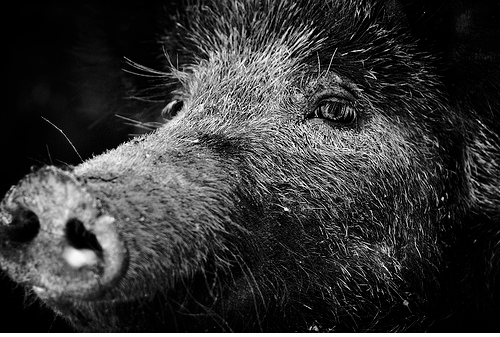Was killing all the pigs as stupid as it seemed?

Picture from Ryan Luikens on Flickr
This summer, the government killed all the pigs and we all made fun of it. Now the streets are awash with garbage in part (but not only) because the pigs are no longer eating it, and we still don't know what the longer-term impact on the zabaleen community is going to be. Michael Slackmann made this point beautifully in a recent article, with the wonderfully laconic headline Belatedly, Egypt Spots Flaws in Wiping Out Pigs. Best part:
When the government killed all the pigs in Egypt this spring — in what public health experts said was a misguided attempt to combat swine flu — it was warned the city would be overwhelmed with trash.
The pigs used to eat tons of organic waste. Now the pigs are gone and the rotting food piles up on the streets of middle-class neighborhoods like Heliopolis and in the poor streets of communities like Imbaba.
Ramadan Hediya, 35, who makes deliveries for a supermarket, lives in Madinat el Salam, a low-income community on the outskirts of Cairo.
“The whole area is trash,” Mr. Hediya said. “All the pathways are full of trash. When you open up your window to breathe, you find garbage heaps on the ground.”
What started out as an impulsive response to the swine flu threat has turned into a social, environmental and political problem for the Arab world’s most populous nation.
It has exposed the failings of a government where the power is concentrated at the top, where decisions are often carried out with little consideration for their consequences and where follow-up is often nonexistent, according to social commentators and government officials.
In the meantime, the government is now declaring a war on education (well perhaps it won that one a while back) and has postponed primary and secondary school until early October, leaving millions of parents with kids on their hands, and millions of kids who don't know what to do with themselves. For many of them it may seriously impact the all-important end-of-year exam (esp. for students taking the thannawiya amma), and again it's not clear whether there is a compelling reason to stop school.
Although both of these decisions seem ridiculous to me and many others, I'm not an epidemiologist. As political decisions, I analyze them as part stemming from the politician's universal need to be seem to be doing something, even when nothing can be done, and in part from this regime's top-down, no questions asked, decision-making patterns. But New Scientist asked a qualified person to look into the matter and things are more ambiguous:
When swine flu started spreading globally last spring, the Egyptian government decided to slaughter all the Copts' pigs, tens of thousands of them. This made little epidemiological sense: the pandemic virus originated in pigs, but by then it was already a disease you get from people, not pigs. Just an excuse for someone to curry electoral favour by Copt-bashing, some concluded. Verdict: killing pigs bad.
But then, maybe getting pigs out of Egypt wasn't such a bad idea. If the H1N1 swine flu virus hybridises with the H5N1 bird flu virus, it could spawn one that spreads like swine flu and kills like bird flu - not a nice thought. Egypt has plenty of H5N1 in birds and a steady trickle of cases in people, including several at the time of the pig slaughter: in total 27 Egyptians have died of it. There has already been a false alarm about swine and bird flu co-infection in Egyptians.
The two may also co-infect pigs and hybridise there. There is H5N1 bird flu in Chinese and Indonesian pigs, and lots in Egyptian chickens, so it seems unlikely that the Copts' scavenging, urban swine would be free of it. H5N1 has shown little inclination to hybridise with human flu in pigs so far, but the pandemic swine flu virus, which seems right at home in pigs, may be less picky. Verdict: killing pigs good.
Or maybe not. The Copts' pigs were the main system for getting rid of food waste in Egypt's crowded, chaotic cities. Now it is piling up and rotting. And with Egypt keeping schools closed until October to delay the pandemic, there are even more kids than usual playing in the stuff. Pandemic or no pandemic, this cannot be a good thing disease-wise. Verdict: who can tell by this point?
That conclusion would reinforce my initial impression: might as well done more scaled-back, sensible measures (like handing out mouth masks to kids or trash workers) than these massive steps with many unforeseen consequences.
